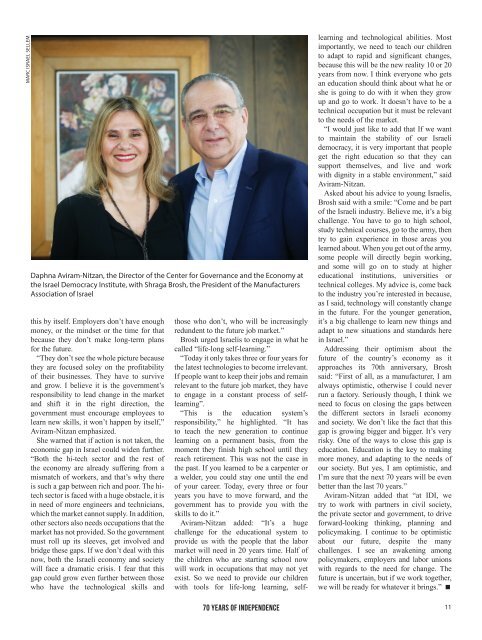IDI.2018
Create successful ePaper yourself
Turn your PDF publications into a flip-book with our unique Google optimized e-Paper software.
MARC ISRAEL SELLEM<br />
Daphna Aviram-Nitzan, the Director of the Center for Governance and the Economy at<br />
the Israel Democracy Institute, with Shraga Brosh, the President of the Manufacturers<br />
Association of Israel<br />
this by itself. Employers don’t have enough<br />
money, or the mindset or the time for that<br />
because they don’t make long-term plans<br />
for the future.<br />
“They don’t see the whole picture because<br />
they are focused soley on the profitability<br />
of their businesses. They have to survive<br />
and grow. I believe it is the government’s<br />
responsibility to lead change in the market<br />
and shift it in the right direction, the<br />
government must encourage employees to<br />
learn new skills, it won’t happen by itself,”<br />
Aviram-Nitzan emphasized.<br />
She warned that if action is not taken, the<br />
economic gap in Israel could widen further.<br />
“Both the hi-tech sector and the rest of<br />
the economy are already suffering from a<br />
mismatch of workers, and that’s why there<br />
is such a gap between rich and poor. The hitech<br />
sector is faced with a huge obstacle, it is<br />
in need of more engineers and technicians,<br />
which the market cannot supply. In addition,<br />
other sectors also needs occupations that the<br />
market has not provided. So the government<br />
must roll up its sleeves, get involved and<br />
bridge these gaps. If we don’t deal with this<br />
now, both the Israeli economy and society<br />
will face a dramatic crisis. I fear that this<br />
gap could grow even further between those<br />
who have the technological skills and<br />
those who don’t, who will be increasingly<br />
redundent to the future job market.”<br />
Brosh urged Israelis to engage in what he<br />
called “life-long self-learning.”<br />
“Today it only takes three or four years for<br />
the latest technologies to become irrelevant.<br />
If people want to keep their jobs and remain<br />
relevant to the future job market, they have<br />
to engage in a constant process of selflearning”.<br />
“This is the education system’s<br />
responsibility,” he highlighted. “It has<br />
to teach the new generation to continue<br />
learning on a permanent basis, from the<br />
moment they finish high school until they<br />
reach retirement. This was not the case in<br />
the past. If you learned to be a carpenter or<br />
a welder, you could stay one until the end<br />
of your career. Today, every three or four<br />
years you have to move forward, and the<br />
government has to provide you with the<br />
skills to do it.”<br />
Aviram-Nitzan added: “It’s a huge<br />
challenge for the educational system to<br />
provide us with the people that the labor<br />
market will need in 20 years time. Half of<br />
the children who are starting school now<br />
will work in occupations that may not yet<br />
exist. So we need to provide our children<br />
with tools for life-long learning, selflearning<br />
and technological abilities. Most<br />
importantly, we need to teach our children<br />
to adapt to rapid and significant changes,<br />
because this will be the new reality 10 or 20<br />
years from now. I think everyone who gets<br />
an education should think about what he or<br />
she is going to do with it when they grow<br />
up and go to work. It doesn’t have to be a<br />
technical occupation but it must be relevant<br />
to the needs of the market.<br />
“I would just like to add that If we want<br />
to maintain the stability of our Israeli<br />
democracy, it is very important that people<br />
get the right education so that they can<br />
support themselves, and live and work<br />
with dignity in a stable environment,” said<br />
Aviram-Nitzan.<br />
Asked about his advice to young Israelis,<br />
Brosh said with a smile: “Come and be part<br />
of the Israeli industry. Believe me, it’s a big<br />
challenge. You have to go to high school,<br />
study technical courses, go to the army, then<br />
try to gain experience in those areas you<br />
learned about. When you get out of the army,<br />
some people will directly begin working,<br />
and some will go on to study at higher<br />
educational institutions, universities or<br />
technical colleges. My advice is, come back<br />
to the industry you’re interested in because,<br />
as I said, technology will constantly change<br />
in the future. For the younger generation,<br />
it’s a big challenge to learn new things and<br />
adapt to new situations and standards here<br />
in Israel.”<br />
Addressing their optimism about the<br />
future of the country’s economy as it<br />
approaches its 70th anniversary, Brosh<br />
said: “First of all, as a manufacturer, I am<br />
always optimistic, otherwise I could never<br />
run a factory. Seriously though, I think we<br />
need to focus on closing the gaps between<br />
the different sectors in Israeli economy<br />
and society. We don’t like the fact that this<br />
gap is growing bigger and bigger. It’s very<br />
risky. One of the ways to close this gap is<br />
education. Education is the key to making<br />
more money, and adapting to the needs of<br />
our society. But yes, I am optimistic, and<br />
I’m sure that the next 70 years will be even<br />
better than the last 70 years.”<br />
Aviram-Nitzan added that “at IDI, we<br />
try to work with partners in civil society,<br />
the private sector and government, to drive<br />
forward-looking thinking, planning and<br />
policymaking. I continue to be optimistic<br />
about our future, despite the many<br />
challenges. I see an awakening among<br />
policymakers, employers and labor unions<br />
with regards to the need for change. The<br />
future is uncertain, but if we work together,<br />
we will be ready for whatever it brings.”<br />
70 YEARS OF INDEPENDENCE 11
















